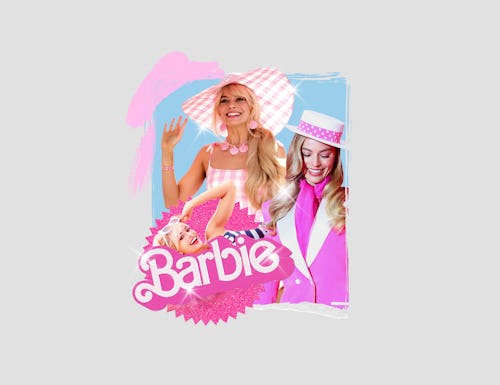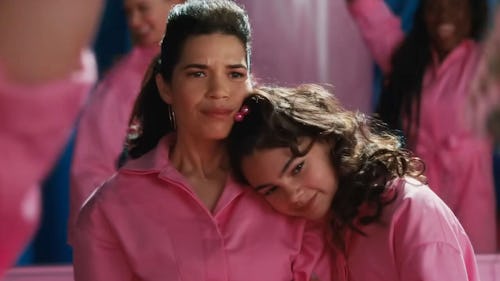
As a young Trinidadian girl whose parents didn’t have Barbie money, I would pine over my friends’ dolls, dreaming of the day when I could own one of my own. For a young Black girl with big curly hair, the ideals of Barbie were always slightly unattainable — not only because I couldn’t afford her, but also because I didn’t know many people who were that tall, that white, that blonde. Still, Barbie was a significant figure for my friends so she had a hold on my imagination and even as an adult, I’m not immune to her complicated narrative. When the Barbie movie started covering every imaginable surface of pop culture in bright pink (a rather complimentary shade, I might add), I knew my kids (ages 8 and almost 4) were too young to see it, but I jumped at the chance to take my 13-year-old niece.
As a Black, antiracist feminist, I had high hopes for the movie, based not only on the reviews but on the right wing pundits who decried the film’s “wokeness.” When racist, sexist, transphobic people tell me not to see something, you best believe I’ll be rushing to get my ticket. Add to that the fact that the movie royally pissed off Ginger Gaetz, wife of Republican congressman Matt Gaetz, and I was convinced this was the movie for me. When I sat in the theater, though, I was filled with complicated thoughts that left me wanting more.
They say the best movies are those that generate ongoing dialogue and I applaud Greta Gerwig’s creation for doing just that. I, for one, want everyone to see it so we can unpack it together. So I’m sharing my thoughts in hopes that it ignites yours to further this necessary and multi-layered discussion of feminism.
The following contains spoilers for Barbie.
The Barbies get community organizing.
I’ve had a hand in organizing many a march and I can tell you that the type of shared leadership and community organizing that the Barbies did to gain back power made my little heart sing. I was like, “Yes! Reach the people one by one and then help them see their role in the movement! Give them back the power! Power to the people!”
Barbie can do hard things.
I loved that, in giving up her life in Barbie World, Barbie (played with effortless flair by Margot Robbie) did something scary and courageous that hadn’t ever been done (with success) before. Her life in Barbie World was a bit predictable and she loved it because she held so much privilege. The Real World was full of unknowns for her (and for everyone else) but she still delved in with bravery. Yes to Barbie blazing her own path even when it’s not clear to her.
I wished that the Barbies could reimagine a whole new system.
Despite the movie’s potential, it fails to imagine outside the box of patriarchy.
Even though we live in a culture where feminism is still co-opted, misinterpreted and debated on the right, the movie wasn’t nearly as “woke” as it had the potential to be. The film had the potential to be a graduate-level class in the impacts of grassroots organizing to create lasting change, but as much as they tried to tackle these big questions, the storyline didn’t land that lesson sufficiently. I wished that the Barbies could reimagine a whole new system — one without the tools that were used to oppress them, and outside the grips of the limitations that have been put on them by these very systems. For example, I delight in imagining what the storyline could have achieved without the impact of capitalism, without the option of change in the Real World only when it is in service to the mighty dollar.

It’s a movie that I both deeply love for what it represents for so many young and old feminists; for so many of us that need to see Black and trans and Latina representation on the big screen — and that I wish had gone even further, in envisioning a radical, bold, new existence for all of us.
If we only get supporting roles is it really representation, though?
My daughter watched Frozen for the first time 6 months ago. Harmless movie for a 3-year-old, right? Actually not quite, because she’s still asking for long blonde hair and getting upset that her beautiful curls don’t sit straight like Elsa’s. The point of Frozen for my daughter is lost somewhere in the midst of the impact of white dominance. We live in a society where whiteness is assumed to be the norm and where it permeates so much media that surrounds our kids. Even if my daughter isn’t going to see the Barbie movie, she’s still seeing the movie posters, the ads, and so much more of the marketing that has dominated our consciousness and that continues to send the message to young Black and Brown girls that white, thin, blonde people are the stars that deserve to be centered.
While I was super excited to see characters in Barbie with a variety of skin tones, hair textures, and ethnicities, the two major leads of the movie, Barbie and Ken (a platinum Ryan Gosling who exhibited an impressive range in his representation of the ills of patriarchy), were still white, blonde, thin people. Yes, America Ferrera’s character, Gloria, ultimately suggested a new Barbie who would challenge these perfectionist norms and, yes, the movie acknowledged the irony of these castings — but they still chose leads that don’t reflect my children’s identity and so many other people’s.
Ultimately, the movie acknowledged the absurdity and the problem with a room full of white men running a company centered on ‘feminism’ and geared towards little girls — and still did nothing about it.
I so wish that a Barbie movie could star an actor who isn’t what society frames as the ideal norm — even if this film does call attention to Barbie’s “stereotypical” type. Yes, that would be a totally different storyline. Yes, the plot of the movie included an analysis of those perfectionist ideals. But can we make our case and teach lessons without centering white, thin, blonde normativity in the process? I think we surely can.
We have to talk about that “joke.”
The completely racist and inappropriate joke at the expense of Indigenous people that Gloria cracked was just gross. When realizing that the dolls in Barbie-land have been completely — and weirdly easily — brainwashed by the Kens’ patriarchal visions, she says, “Oh my god! This is like in the 1500s with the Indigenous people and smallpox. They had no defenses against it!” To make light of the pain and suffering of people who are still dealing with this country’s apathy towards the impact of colonization was wrong. To the writers who still use Indigenous people as interjections to add supposed “wit,” just stop.
What does it mean that Gloria’s power only broke through in Barbie Land?
As the movie wound on, I was anxiously waiting for the end. I was sure that Gloria’s monologue — the one that snapped the dolls out of their stupor, the one that I want to play on repeat, the one that will go down in history as one of the best feminist speeches in a movie, the one where Gloria proved that she was one of the few adult humans who actually fully understood and embodied a vision for Barbie that was grounded in true liberation for all, men and women alike — I was sure that monologue would lead us to her taking over “Mattel” in the Real World. Instead, the company stayed under the control of a white dude who showed his ultimate allegiance to capitalism and not liberation. What a missed opportunity to show what feminist leadership could look like in the Real World. What a roaring feminist manifesto it would have been for Gloria to go from working for the CEO to being the CEO, replicating the feminist power of the dolls. Her trajectory fell flat, especially in contrast to the fearless leadership in Barbie World. Perhaps Gerwig is attempting to make the commentary that such a shift isn’t likely in real life, but I argue that giving space to our dreams is the first step in starting to envision and then give birth to them.

Ultimately, the movie acknowledged the absurdity and the problem with a room full of white men running a company centered on “feminism” and geared towards little girls — and still did nothing about it. Capable, strong women of color continuing to need permission from white men for our brilliant ideas to be accepted and brought to fruition (only if the dollar signs line up, of course) is a trait of a system that is bound to fail us over and over again.
What the Barbie movie has done for so many feminists across the world can’t be understated… and I’m dreaming about the day when Hollywood can use its radical creativity to imagine completely breaking apart harmful systems. I dream of the day when a feminist movie truly captures the type of bold change that we want to envision for this world (for us and our kids), one where undeserved power is ceded and where intersectional feminism is a core part of liberation for all, not just a bright pink paint job on oppression. I’m dreaming of centering people who belong to communities pushed to the margins in huge summer cultural phenomenons that I believe would be met with smashing box office success.
So yes, when my kids are old enough, I will show them the Barbie movie and we will be pausing often to unpack and discuss the ways in which it could have been more grounded in the world we want to build together — instead of merely playing with the pieces of the world we’ve inherited.
Raising Anti-Racist Kids is a column written by Tabitha St. Bernard-Jacobs focused on education and actionable steps for parents who are committed to raising anti-racist children and cultivating homes rooted in liberation for Black people. To reach Tabitha, email hello@romper.com or follow her on Instagram.
0 comments:
Post a Comment